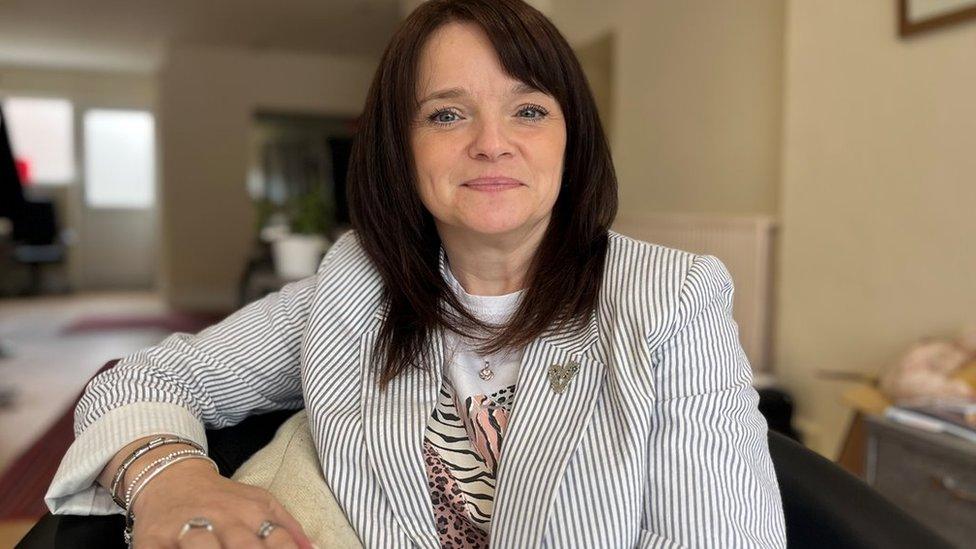PMDD: Period-related condition causing extreme distress
- Published
'I remember sitting on the floor and screaming'
An extreme hormonal condition has left some women battling emotional distress because of a lack of help, campaigners say.
Premenstrual Dysphoric Disorder, external (PMDD), which is linked to periods, is thought to affect more than one in 20 women.
Sufferers want medical students to get compulsory education on a problem one called an "evil monster" inside her.
The Welsh government said it recognised there was insufficient recognition of PMDD and its devastating consequences.
Bella Humphries said she was more than happy to tell people that "my period sometimes makes me want to take my life", adding: "It's secrecy and silence that will kill people, not the disease or the disorder."
Rhondda MS Buffy Williams said she was unable to do anything for three weeks a month and described her experience as "soul-destroying", with her symptoms so severe she had a hysterectomy at 34.
PMDD causes a range of mental and physical symptoms in the two weeks leading up to a period, including anger, depressed mood and anxiety - which lift completely during menstruation.
According to the International Association for Premenstrual Disorders, external, 34% of people who have been diagnosed with the condition have attempted suicide.
"You're on a seven-day bender where you're making the worst possible decisions of your life, you're sort of setting your life on fire on purpose," is how Bella described it.

Bella Humphries has been using laughs to spread awareness of the condition by describing the impact it had on her
The 29-year-old from Conwy has turned the devastating impact it had on her life into a radio comedy.
She joked she decided not to drive into a tree because it would harm the reputation of female drivers - but the suicidal feelings behind her gags were a monthly occurrence.
Diagnosis takes on average 12 years.
For Ms Humphries, she knew something was wrong the moment she started having periods - and said from then, her symptoms got worse.
"I was not getting out of bed, I couldn't get through basically any conversations without crying," she said.
"There was a lot of screaming and just feeling like my world was over and it didn't really matter what anybody said to me, they couldn't understand how it felt inside of me."
According to the Royal College of Nursing, PMDD affects 5% to 8% of menstruating people, yet Ms Humphries admitted she had never heard of it until she was diagnosed privately.
Campaigner Becci Smart, 36, wants to make it compulsory for medical students in Wales to learn about PMDD.
Her symptoms started at 14, yet it took her 18 years to get a diagnosis.
"Nobody told me that feeling suicidal before your period isn't normal," she said.

Labour politician Buffy Williams has called for more research into how women can be helped
She described it as an "evil monster" inside her wanting to break out every month, saying the "black cloud" took its toll on family relations.
If a petition she has launched gets 10,000 signatures, it will be debated in the Senedd.
Ms Williams, a Labour member of the Senedd, said: "It was almost like every single movement, every single part of my life revolved around my period.
"You'd be back and fore the doctor, making appointments all the time, going to see the nurse, and the answer was always the same, it's just what women go through."
Her case was so severe, she had to have a hysterectomy - surgery to remove her womb.
"I was totally petrified, but I felt like I had no alternative" she said.
"Surgical intervention shouldn't be the answer, we need far more research into PMDD."
After Ms Williams spoke about her experiences in a Senedd debate, Health Minister Eluned Morgan made commitments to improve care in Wales and make more information available on the NHS website.
There is a lack of understanding and knowledge of PMDD, especially in the UK, according to Dr Lynsay Matthews.
An expert on the condition, based at the University of the West of Scotland, she described the problems as "complex".
"What we hear is that [health professionals] themselves are frustrated with the lack of information, the lack of training, the lack of referral routes for them," she said.
Dr Matthews said teams of experts in mental health, gynaecology and primary care could work together to improve the situation - but research had to happen first.
NHS guidance recommends anyone who suspects they have PMDD keep a diary tracking their symptoms and takes it to their GP.
The Welsh government said: "We recognise that there is insufficient recognition of PMDD and the devastating impact it can have.
"We are working with the NHS Executive to explore expanding online menstrual health information and guidance, inclusive of PMDD."
Bella's documentary Bleeding Hell is available on BBC Sounds
If you have been affected by any issues in this story, you can contact the BBC Action Line
Related topics
- Published15 July 2022

- Published10 May 2023
